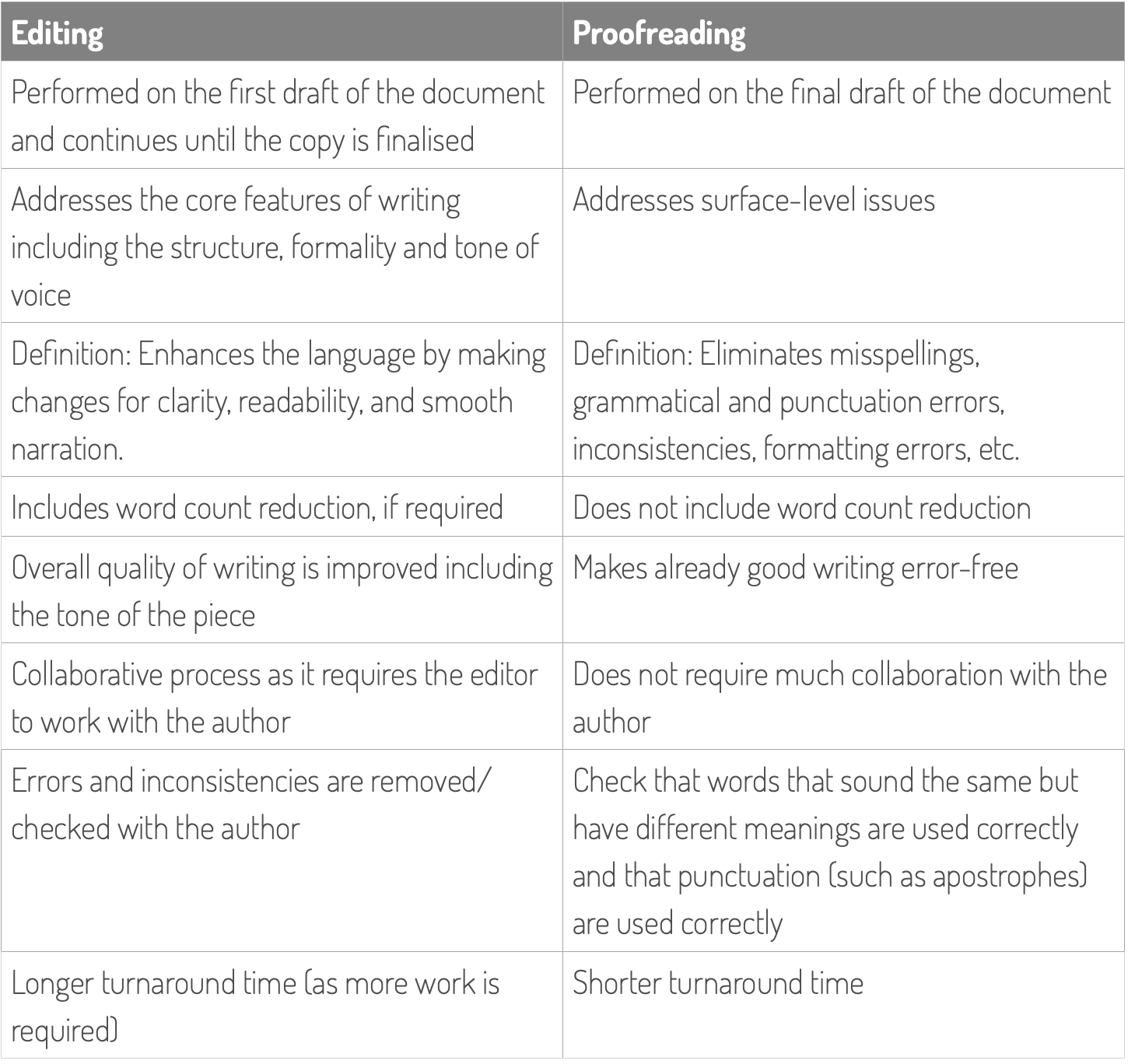Editing and Proofreading: what’s the difference?
Do you know what the difference is between editing and proofreading? You are not alone if you don’t … many people aren’t clear about the difference between the two services and what they need. But editing and proofreading are quite different and produce significantly different outcomes for writers so I thought I would write this article to help you evaluate your options. Editing is done way before a proofreader sees the copy and there may be several rounds of editing!
This is the basic process of document preparation:
Writing
Editing (several rounds of this!!)
Proofreading
Pagesetting (if required)
Proofreader may check pageset copy
Printing
More and more people are outsourcing their editing and proofreading to a professional ‘second pair of eyes’. Depending on the subject area of the written work will dictate whether a specialist editor/proofreader in the author’s field is needed.
Basically …
Editing corrects issues at the core of the writing like sentence construction and language clarity. A thorough editor will help improve the readability, clarity, and tone of the copy and remove inconsistencies in style and facts. They will scrutinise and polish the writing for a smooth narration.
Proofreading is a surface-level check. It is the final check performed on a document before it is typeset/printed or circulated. A proofreader will look for misspellings, grammatical errors and incorrect/missed punctuation.
This table shows the main differences between Editing and Proofreading:
When to use an editor
You should use an editor when
Your document needs substantial revisions for clarity, readability, and flow;
You want to collaborate extensively with the editor to polish and refine your writing.
When to use a proofreader
You should opt for a proofreader when
You are confident of the language and structure of your document and only require basic grammar check to eliminate misspellings, typographical errors, and punctuation errors;
Your document has been edited and only needs a final check before submission.
Do you need an editor and a proofreader?
Some people/companies offer both editing and proofreading services while others specialise in proofreading alone. An editor may include proofreading as part of a contract/service provision but a proofreading service doesn’t include editing.
Both editing and proofreading are required to improve the quality of writing; as explained above an editor and a proofreader work on different aspects of the writing to transform a document into an eloquent written communication.
So, who do you outsource to?
Well this has to be your decision based on how you feel about your document; you might ask a colleague or friend to look through your document and advise. But just remember a proofreader is not a copy editor, so they do not revise or rewrite copy ... well they aren't supposed to. Corrections like this should have been made before any text lands in the proofreader’s desk; but I do sometimes make editorial suggestions and comments!
How can I help?
As an editor I work with an author to understand their style so there is collaboration here; there may be several rounds of editing and often involves suggestions for the author rather than just editorial decisions. My job will be to enhance the language of your copy by making changes for clarity, readability, and smooth narration. If the copy is too long I can look at how it can be cut back and advise accordingly. If there are unnecessary words or overlong sentences this will also be addressed.
As a proofreader I ensure that your content is free of typographical, grammatical, spelling, punctuation and also formatting errors.
Simple? Well it might not sound particularly demanding BUT …
A professional editor is a far more accomplished proofreader than your typical friend or family member and any computer program. They understand the nuances of language, are trained to be methodical and thorough to identify and eliminate the common errors that often plague documentation.
Proofreading is an important service because any writing intended for publication must communicate its message in the clearest possible way. The piece must, therefore, have no spelling, grammar or punctuation errors, or inconsistency in language, as these all undermine the impact of the writing and the credibility of the author.
In conclusion
As you will have read editing and proofreading are different jobs and are designed for different stages of the revision process. Editing provides an opportunity to make your writing better, whilst proofreading is a final check to ensure perfection before publication.
In an ideal world a writer would receive an editing service first, and subsequently a final proofread before publication. In reality, many people select only one service. So you need to to choose the correct one. Hopefully this article will have helped.
If choosing between an editing or proofreading service ask yourself this question: “Are you satisfied with the quality of your writing?” If yes, a proofreading service will generally be your best option. However, if you feel there is scope to improve your writing then editing is the right service for you.
* * *
Cornerstone pa services is here to help YOU and your business. Do get in touch if you have admin tasks to outsource and give yourself more time to focus on other aspects of your business. No task is ever too small or too tedious.


